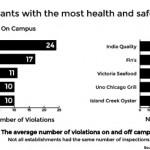As the spring 2015 semester draws to a close, Boston University freshman Abigail Sasdelli is one of many students working out her financial situation for the upcoming 2015-16 academic year.
“BU is already so expensive as it is, and it’s really stressful for me because I cover half of my costs of college,” said Sasdelli, a student in the College of Engineering. “The more that they increase tuition, the more money I have to somehow make to cover it, and I’d really rather not take out loans. At my age, it’s really hard to make that kind of money now.”
Tuition rates will increase 3.8 percent to $48,436 for the 2015-16 academic year, BU President Robert Brown announced in a March 13 email to BU students and their parents.
“We seek efficiencies through improved business processes and controls and streamlining and consolidation of support services where this can be done while maintaining the quality of a Boston University education and our support of students and faculty,” he wrote in the email.
There was a 3.7 percent increase during the 2014-15 year, The Daily Free Press reported on March 18, 2014.
Tuition increases happen every year, but BU’s increases have averaged below the national rate of increase for similar-sized schools over the last decade, said BU spokesman Colin Riley.
“It really does reflect the seriousness and effort by the administration at BU to keep tuition increases as low as possible,” he said. “The trend really is that the university has done very well in keeping below the national average of similar institutions.”
For the 2014-15 academic year, Tufts University’s tuition increase rate was 4.4 percent, Boston College raised its rates by 4 percent and Yale University posted a 4.1 percent tuition rate increase, Riley said.
Brown said in the email that BU will expand financial assistance to roughly 52 percent of the undergraduate population, covering an estimated 8,300 undergraduate students and totaling over $206 million.
Tuition contributes half of the university’s $2 billion operating budget, which supports expenses such as salaries and benefits for faculty and staff, Riley said.
“Students want [and] parents want to see a low faculty-to-student ratio that’s something we work pretty hard at,” he said. “It’s an expensive proposition to recruit outstanding faculty and provide the classroom and lab facilities that are expected.”
Riley said students should view the money for their education as an investment.
“Parents are investing in you [and] you’re investing in yourself to earn a degree and use it to pursue a career in which you will have lifetime earnings that are significantly higher than if you didn’t have a bachelor’s degree or an advanced degree,” he said. “You’re not just paying to attend here, but you’re leaving with something.”
Several students said although they appreciate the efforts of the university to improve the quality of their education, the tuition increases might cause more harm than good.
“Everything is going to be more expensive, especially for an international student. I’m from China. An increase in tuition is really hard for us,” said Florence Feng, a freshman in the College of Arts and Sciences.
Pam Larsen, a senior in CAS, said even though BU is working to expand financial aid for more students, there will still be a large portion of students who have trouble paying tuition in full.
“The university already has a lot a programs that are trying to entice students who pay full tuition,” she said. “BU’s trying to attract a class of people that can pay full tuition, but I don’t really know if that’s what higher education is all about.”
Samantha Gross and J.D. Capelouto contributed to the reporting of this article.
Vice Chairman and archives keeper for The Daily Free Press Board of Directors. Former news editor. I like data, politics, and higher education, but will write about anything.





Tuition is below national average.. but still rising at BU?? What kind of headline is that? You can’t afford BU, don’t go to BU. Pretty simple.